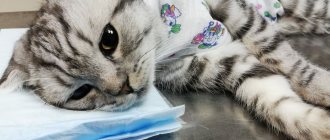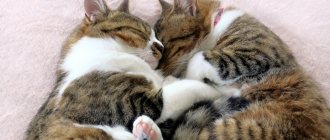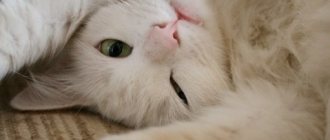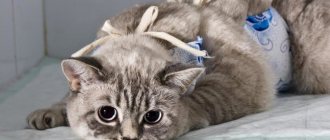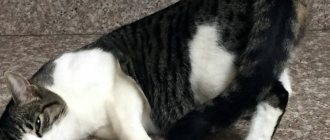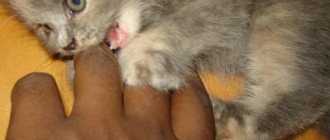How long does sexual heat last and how often does it happen?
The cat's characteristic behavior lasts up to 10 days. The period when a cat is in sexual heat and allows a cat to approach her is called estrus. At this time, the ovarian follicles produce the maximum amount of estrogens and sex hormones.
In the very first days of estrus (1-4 days), the cat demonstrates sexual arousal, but does not allow mating. This time is called proestrus, “forerunner”.
If sexual intercourse does not occur during estrus, then ovulation does not occur. In this case, sexual heat returns every 10-14 days. The period between estrus is called interestrus, this is a time of rest for the uterus and ovaries. In some cats, the concentration of estrogen in the blood does not decrease, and the animal walks constantly. Prolonged heat is a sign of follicular ovarian cysts, which must be removed surgically.
Complete rest of the ovaries, which means the absence of the reproductive instinct, is called anestrus, the absence of estrus. In stray cats, this period occurs in late autumn or winter due to short daylight hours and the action of the hormone melatonin. Anestrus does not occur in domestic cats due to constant light and nutritious food.
The cat does not go to the litter box - reasons and solutions
Let's talk about the reasons why a cat relieves itself past the litter box.
- Medical reasons
- Infections and inflammation. Infectious diseases (cystitis in cats) or injuries can cause excessive urination - the animal does not have time to reach the litter box.
- Thirst. Kidney diseases, diabetes and endocrine diseases cause increased thirst - the cat drinks too much and because of this does not always have time to urinate in the right place. You should be alarmed if the animal drinks more than 70 ml/kg per day.
- Pain syndrome. Painful urination and defecation due to certain diseases (cystitis, constipation, urolithiasis) may be associated with a litter box in a cat. She will try to avoid him.
If you notice that the cat does not go to the toilet at all, does it every other time, or anywhere but in the toilet, rule out health problems - get tested, do an ultrasound. If your cat needs medical attention, your veterinarian will diagnose and prescribe treatment.
- Psychological reasons
- Stress. The stress of moving to a new home can lead to this behavior. Cats love routine; everything should be the way they are used to. Calm your pet, give him time to get used to it, and do not scold him in any way - this can aggravate the problem.
- Anxiety during “estrus.” An excited cat during the period of “sexual heat” can mark everything around, so pay attention to the psycho-emotional state of your pet. There is no need to scold him - this will only make the situation worse. It is best to consult a doctor and, if mating an animal is not part of your plans, then correct its behavior with the help of soothing herbal tinctures.
- Jealousy. Another animal has appeared in your house, and have you noticed that after this your old pet began to end up in the litter box less and less often? Perhaps he does this because he is simply jealous of your new member of the pack. Calm the animal down, show it that you have not stopped loving it. Provide each pet with its own place for food and toilet. It is advisable to place them in different places in the room - do not provoke the cat into a conflict.
- Hostess instinct. No new pets appeared, but friends came in with their dog or cat - this is mini-stress for the touchy cat owner. Pet her and try to get rid of the smell of someone else's animal - this should help.
- Revenge. “Of course, I’m not vindictive - I’ll take revenge and forget,” literally every cat can say this one day. But not everyone, of course, shits past the tray. If this suddenly begins to happen to an adult cat, think about it and ask the cat for forgiveness. Maybe this will help you!
- Bad associations. An animal may refuse the litter tray after a bad experience. Let's say you decide to pet a cat while doing toilet chores - this could frighten and distract the cat. Or you tried to give her a nasty drug while she was sitting in the litter box. The cat may remember these moments and stop going to the litter box. The solution is to move the cat's litter box to a more secluded place and do not disturb the pet during such an important process.
- Tray related problems
- Dirt. Cats are very clean animals, make sure the litter box is clean enough. Wash it thoroughly, but don’t get carried away with detergents and disinfectants - the cat’s smell should remain near the tray. Replace the litter with a clean one. Check the cleanliness of the litter scoop - a dirty scoop can leave an odor that a person cannot smell, but it can repel animals. Often, dirt around the litter box discourages cats from using their litter box.
What doesn't help during heat?
What you definitely shouldn't do:
- Stroke the cat and pay attention to it: tactile contact only increases sexual arousal.
- Give herbal sedatives: the cat is not stressed and she is not nervous, she wants to reproduce. Owners can drink “Persen” with “Novopassit”; no herbs will affect the cat’s behavior.
- Use products with pheromones such as Feliway. They really help you survive the trip, get comfortable in a new place, and welcome a new family member. But they are expensive and absolutely useless during heat.
How to behave in this situation
There are different ways to solve the problem if your pet goes on a spree. It all depends on the owner, what he is ready for, what he puts at the forefront: the health of the animal or his own peace of mind? When making a decision, you should weigh the pros and cons.
The first way is to set free
When a pet goes on a spree, it loses its appetite and constantly tries to escape outside. Holding an animal all day without taking any measures is very difficult. A cute, fluffy and kind pet suddenly stops responding to the calls of family members, does not hear anything, only screams heart-rendingly under the door, dreaming of jumping out at the first opportunity. The simplest and easiest way is to simply open the door . After some time, the cat will return happy and calm. But there is one drawback - along with a good mood, it can bring a whole bunch of diseases. You will have to treat until your next spree.
The second method is medications
Some cat lovers may use special medications. The veterinarian must examine the animal and prescribe medication based on the characteristics of the particular pet. Such drugs are usually available in the form of drops or tablets. Drops are more convenient to use; tablets must be mixed with food. In this way you can suppress the sexual instinct of cats. It has not yet been established what consequences their regular use may lead to.
Sometimes they give a hormonal injection. For six months, the cat will lose interest in the opposite sex and stop going for walks.
© shutterstock
The third method is castration
The main task of every owner is to help their pet. What to do when the cat goes on a spree at home? The most popular method is castration. This is a surgical procedure to remove the testes. A cat should be castrated only if there is no desire to have offspring. This procedure is best performed at the age of 8 – 15 months .
The operation is considered simple and, as a rule, does not cause complications. After the operation, you need to make sure that the cat does not lick the wound and carry out regular treatment with iodine. For many owners, castration is the best option, although not very pleasant.
Is there any way to help a cat during heat?
A feature of the reproductive system in cats is induced ovulation. Simply put, an egg is released from the ovary only in response to vaginal stimulation. Natural ovulation occurs 1-2 days after intercourse, and after another 1-2 days estrus stops.
Therefore, the owner can imitate sexual intercourse and thereby speed up the end of the cat’s estrus and torment. To do this, the animal is firmly grasped by the skin at the withers, and with the other hand, pressure is applied to the sacrum. When the cat moves its tail to the side, a suitable object is inserted into the vagina approximately 2 cm. This can be a thermometer with a soft tip lubricated with ointment or a cotton swab wrapped in latex. The procedure should be repeated several times within an hour, and then again after 12 hours. If the massage was successful, the cat begins to meow loudly and roll on the floor.
The onset of ovulation causes a false pregnancy. The estrus stops after a couple of days and does not return for 1-1.5 months. But this method cannot be used regularly, so as not to provoke inflammation of the uterus.
Folk remedies: a cat wants a cat
There are a lot of folk methods that are designed to reduce sexual desire in an animal.
Folk remedies, a cat wants a cat:
- Distracting . Usually the cat is dipped in cold water, or simply doused from a mug. Thus, the cat's task changes, instead of screaming, it licks itself. However, it is necessary to repeat the procedure constantly until the cat asks for the cat.
- Coat the animal's face with butter. The effect is the same, the animal constantly licks itself, during which time the screaming stops.
- Using a neutered cat . The main question is where to get it. Indeed, after mating with a castrated cat, the cat calms down for a while. However, this is not a 100% method, since some animals, even after a successful mating, which ends in offspring, can become very active for another three to four days until the end of estrus, screaming, meowing and not allowing members of the household to rest.
- Imitation of sexual intercourse. Usually, this requires grabbing the cat at the withers and dragging it, as a cat does during mating. Many also recommend feeding your cat various decoctions. The most commonly used soothing herbs are motherwort, tincture of valerian, lemon balm and mint. If the animal does not want to drink such drugs, they are usually introduced into dry food, or into the food that the animal is fed.
cat
Six basic short theses about estrus in cats
- Puberty in cats occurs at 6-9 months.
- On average, estrus lasts a week and, in the absence of mating, repeats every 2-3 weeks.
- Behavior during estrus is largely determined by breed. There are cats that walk quietly and little. Others are literally climbing the wall.
- The only way to calm a cat is to induce ovulation with a special massage that simulates sexual intercourse.
- The use of hormonal agents or surgical sterilization should be considered before the onset of estrus.
- Repeated “empty” periods of sexual heat cause diseases of the genital organs - ovarian cysts, pyometra, hydrometra.
Publishing partner:
What is estrus?
The word "estrus" is the scientific name for estrus. During estrus, psychophysiological changes occur in the body. Follicles mature in the animal’s ovaries, ovulation occurs, and conception becomes possible. During estrus, your pet's behavior changes noticeably.
The following signs indicate that a cat is walking:
- The pet becomes overly affectionate, or, conversely, shows inexplicable aggression.
- Meows loudly and invitingly. During estrus, a cat can call for a male for days. Read the article “Why does a cat constantly meow and yell throughout the day?”
- Frequent urination due to physiological changes in the body.
- The presence of clear discharge on the genitals. Therefore, your pet will lick itself more often.
- There is also a decrease in appetite. For some, interest in food may disappear altogether. This condition can occur in the first few days of estrus. Although some people may experience worsening appetite throughout the entire estrus phase.
- The genitals may be slightly swollen. But often only an experienced veterinarian can recognize this.
- Changes in gait. The cat bends its front legs halfway, raises the back of its body, lifts its tail or moves it to the side.
- The cat may begin to mark its territory.
These signs can be observed alternately or in combination.
When do cats start walking?
Many owners are interested in how long a cat walks, because this period cannot be called pleasant. The cat constantly purrs and screams - the owners are guaranteed sleepless nights at this time. In addition, some individuals, not finding a male, even try to run away from home. But, before answering the question regarding the duration of estrus, you should understand at what age it begins.
The time at which cats go into their first heat is influenced by the onset of their puberty. It is impossible to say exactly when your pet will begin her first estrus period. Everything is purely individual. But on average, a cat’s first ovulation occurs at 6-8 months. But for some it may be a little later - by 1 year.
The onset of puberty is influenced by various factors. For example, the size of the pet, its breed, the presence of a cat nearby. The age at which cats start estrus for the first time even depends on the season and color of the animal.
But, as a rule, the first estrus in cats normally begins before the age of one year. Later is considered a deviation. If your pet is over a year old and still hasn’t started to come into heat, you should contact your veterinarian. The animal probably has some kind of disease or hormonal imbalance.
It also happens that a cat’s sexual heat practically does not manifest itself; this condition is called “erased estrus.”
As a rule, it is typical for sick and weakened animals. Erased estrus can also occur in completely healthy pets that have little temperament. In any case, your pet should be shown to the veterinarian.
Hormones
During the period from 2 weeks to 6-7 months after removal of the reproductive organs, the cat walks due to the presence of progesterone residues in the blood. Hormones that influence behavior are also produced by other organs: the pituitary gland and adrenal glands. The older the animal that was sterilized, the greater the likelihood of this outcome.
To solve the problem, you need to consult a veterinarian. To eliminate symptoms, the administration of a hormonal drug (Covinan, Depo-promone, etc.) is required. If you miss time, the cycle becomes permanent. But only a veterinarian can prescribe medicine and give an injection.


